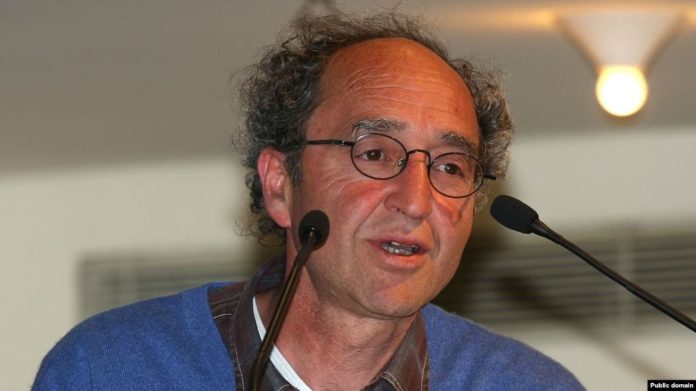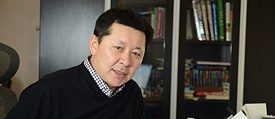Goethe, Poetry and Truth Honored at Weimar Ceremony
Sep/22/2019 Archived in:Armenian Genocide | Culture

Dogan Akhanli (Photo courtesy of RFE/RL)
by Muriel Mirak-Weissbach
WEIMAR, Germany, SEPTEMBER 12, 2019 — If today’s cultural context is besieged by “deliberate attempts to mislead” and to cut off meaningful discussion, if it is a context in which unfounded opinions enjoy the freedom of unfettered movement, then it is necessary to juxtapose with such “hideous developments” an understanding of Truth and Fiction.
Thus Klaus-Dieter Lehmann, President of the Goethe-Institut, presented the motto of this year’s award ceremony of the German cultural institution. Dichtung und Wahrheit is the title of one of Johann Wolfgang von Goethe’s major works, and it symbolizes the idea behind the selection of the three winners of the Goethe Medal, presented in Weimar on August 28, the 270th birthday of the national poet.
This year’s recipients of the official decoration of the Federal Republic of Germany are the German-Turkish writer Dogan Akhanlı, the Iranian artist and filmmaker Shirin Neshat and the Mongolian publisher and political journalist Enkhbat Roozon. Lehmann said it was not political activism, but rather, their independence, that established the credibility of the three.
The festive ceremony in the Kleine Weimarhalle was attended by 200 guests, and in addition to the Goethe-Institut representatives were Lord Mayor of Weimar Peter Kleine, Cultural Minister Benjamin-Immanuel Hoff and Andreas Görgen, director of the Department of Culture and Communications in the Foreign Ministry. It was featured widely in the German media.

Shirin Neshat (Photo Courtesy of the Goethe-Institut)
Klaus-Dieter Lehmann was joined by Ina Hartwig, the head of cultural affairs of the City of Frankfurt to present the award. In his opening remarks, the institute’s president said they were “honoring personalities who, through their work, address the conflicting poles of social reality between influence and autonomy, ignorance and culture of debate, unknowing and education, and do so regardless of possible personal risks or disadvantages.” Christina von Braun, second vice president of the Goethe-Institut, added, “With their works, which wake people up and create new relationships, the laureates play a central role in culture and international exchange.”

Enkhbat Roozon (Photo Courtesy of the Goethe-Institut)
The Power of Language
Enkhbat Roozon received the honor in recognition of his indefatigable efforts to develop an open, critical and responsible civil society in Mongolia. The central focus of his publications is education, which he views as the foundation for cultural exchange. He places special emphasis on the importance of language in his work. “Unfortunately,” he said, “in today’s society, we talk far too little with one another about the important issues, and we also don’t maintain and develop language as such. And yet, what is to become of us and what we can achieve — whether we will be able to solve our problems or not — relies precisely on this.”
The language used by Shirin Neshat is visual; in her films and photographs, she focuses on the role of women in the Muslim world. Due to a ban on entry into Iran, she lives abroad, and was not able to attend the ceremony in person. A close friend, Vahideh Mahmoodi, accepted the Goethe Medal for her and Neshat addressed the ceremony in a video message, in which she expressed her solidarity with all refugees living in exile in Germany.
In her laudatory speech, the art scholar Britta Schmitz stated, “With all of her delicately and carefully conceived works, Shirin Neshat manages to create a unique narrative entanglement by producing haunting stories and images that are hard to forget and that transcend cultural boundaries.”
A Poetical Notion of Time
Akhanlı received the award for his literary works and his engagement in civil society to promote understanding, especially among Armenians, Kurds and Turks. According to press accounts, the jury referred to him, saying “There are some personalities who cannot keep quiet when it is a matter of justice.”
His is a history of speaking out, against the military dictatorship in Turkey in the 1980s, against the policy of denial of the Armenian Genocide and against repression in Turkey today.
In her laudatory speech, literary critic Insa Wilke developed the concept of “time” in the author’s works, his novels, dramas and also cultural activity. What does it mean to put time itself into question? This is a matter that engages Aklanlı in his writing. It may be that one leaves out individuals and entire groups completely, and lets them reappear in other temporal spheres, or sends them running around in bureaucratic circles; this “robs them of the idea of a future and drives them crazy with the question whether what they experienced, and experience, is taking place in their time reckoning, or belongs to another reality.” States also manipulate time this way.
Akhanlı, she said, renders this visible. He “makes the consequences visible, not only for individuals but for entire societies.” Yet, in so doing, “he is not writing political literature; he is writing politically.” In a certain sense, he is old-fashioned, as he wants to “make a difference, to change something.”
To illustrate how Akhanlı makes time visible, she referred to his novel, The Judges of the Final Judgment, in which he writes about the real historical events of 1915; but he is using an image that means “much more than the Armenian genocide, it means its narrative and its denial or removal, it means the presence of those killed and, if one so desires, the other side of state terror in Turkey in the 1980s.”
She described how Akhanlı juggles and entangles time intervals, how he combines and mixes historical and fictional figures, and she admitted being confused when she first entered “his literary space.” The confusion emerged “because I knew practically nothing about Turkish history and absolutely nothing about what it had to do with me. Confused by overlapping and simultaneous events….” By way of explanation, she quoted him as saying, “You cannot tell the story of catastrophes in chronological order.”
Akhanlı deals with the similarities among very different tales of violence, and raises the question of what stories are passed from one generation to the next, “among Turks, Germans, Armenians, Syrians, Black Germans, Herero, Roma, Vietnamese?… How are their stories connected and related? … What does it all have to do with us sitting here?” Here one encounters what the author calls the “transnational space of memory.”
Insa Wilke drew attention as well to the special qualities of the novelist’s style, in particular, his talent for comedy, which she likened to that of the fantasy master Nasreddin Hodja. Akhanlı deploys the element of comedy when dealing with the horrible and frightening; and this provokes laughter, “the laughter of the theatre of the absurd in repressive systems,” it leads to “an empowerment of self.” In his works, she said, he “seeks out the theatrical, the poetical qualities in the events of the time.”
Akhanlı writes in Turkish and the German reading public knows his works through translation. But he has a fine knowledge of German, and wrote the monodrama “Anne’s Silence” in German. Wilke pointed to his “fine appreciation for the weight of words,” citing an example he once gave of how German syntax manages to deal with “a problematical relationship to responsibility,” by postponing the predicate to the very end of the phrase, in such a manner that the reader can hardly put it in relation to the subject.
In concluding her remarks, Wilke said, “Literature can also change a person,” adding that her encounter with his works had changed her view of society.
In his acceptance speech, Akhanlı seemed to pick up the theme introduced by Wilke, about language. “What I especially like about the German language,” he said, “is the past tense of the subjunctive mood.” This is a form that “opens up for us a world of unreality, of dreams and improbabilities.” In his favorite form of this, “fantasy is projected into the past. This form sometimes looks so complicated and at the same time so beautiful, that I have the feeling that it is not a sentence but a magical formula that lies before my eyes.”
As an illustration, Akhanlı told the story of how he came to win the Goethe prize: “Had my partner not had the desire two years ago to celebrate her birthday together with me in Granada, I would not be standing here. If the Turkish government at that time had ceased criminalizing me further, I would not have been arrested in Granada again and the Goethe-Institut in Spain would not have learned of my arrest, and I would not have been the guest of the Goethe-Institut in Madrid for two months. If all that had not happened, I would not have written the book, Arrest in Granada, would not have been invited to Armenia by the Yerevan Goethe-Institut and Ms. Bachsoliani and Ms. Soghomonyan, and would not be standing here now.”
He said that events could have unfolded quite differently. “If the German press had not shown interest in my case; if the German Chancellor and the Foreign Minister had not intervened; if my German lawyer Ilias Uyar and my partner Perihan Zeran had not managed to get tickets to fly to Madrid; if my Spanish lawyer Gonzalo Boye at the time had been in Vietnam or somewhere else in the world. But in the end, everything went well. I was saved in time and stand here now, as a prize winner of the Goethe Medal. And I do not really know whom I should thank for this prize that makes me so proud. But I do know, my persecutors and their attempts to criminalize me have failed. Through the solidarity of so many, which is just as magical as the second case of the subjunctive.”
The author proceeded to thank those many, many people, associations, friends and officials who intervened on his behalf as well as those in the jury who honored him with the award. “I accept the Goethe Medal with pleasure,” he said, “and I dedicate it in tribute to the imprisoned Cologne artist Hozan Cane, who like tens of thousands of other people has become a victim of state despotism and arrogance in Turkey.”
Time and Place
Turning to the issue of state violence and terror, which “have accompanied me all my life,” Akhanlı cited a consideration made by the Israeli writer David Grossman, who noted that people usually refer to Holocaust as having happened “then.” Yet, in Yiddish or Hebrew, Grossman said, one doesn’t speak of “then” but rather “over there.” And by this he didn’t mean a place, but an immaterial location, “a place in the human soul.” For Grossman, this “will to destroy” still existed. And, Akhanlı said, “we are at this very moment right ‘over there.’ Weimar is not only Goethe and Schiller, but also Buchenwald, the former concentration camp. But,” he asked, “are we not also ‘over there’ in another sense, in Grossman’s sense?”
Here Akhanlı related his personal experience with the Holocaust, whose dimensions he had not realized before leaving Turkey. “At the end of 1991, I fled to Germany with my family and my memories of the long history of violence of my country. It was at the time that the former Buchenwald prisoner and surviving Spanish writer and Goethe Medal winner, Jorge Semprùn, saw that the country that had tortured him and wanted to eliminate him was undergoing a process of change.” In the 1990s, the years of remembrance, Akhanlı witnessed this transformation himself; whereas in his homeland “forgetting was the rule and remembrance was the exception,” in Germany the opposite was the case.
“Remembrance,” he hoped, “could be a means to establish the connections between historical and current violence in my homeland as well, and to come to terms with them. Remembrance could be a key, I hoped, to understand what my personal experience with violence had to do with the victims of the Armenian genocide 100 years ago, with the persecution, despotism and injustice against Kurds, Alevis, Jews, Christians, against homosexuals and women in Turkey.”
Stimulated by his experience in Germany, he began to “think beyond borders and timeframes” and find the links with these victims and others, in other periods and other lands. Because of the work done in Germany to confront and deal with the past, “I was able to identify with this country,” he said. “I liked the fact that people did not like to use words like ‘nation,’ ‘flag,’ ‘fatherland,’ or ‘nationalistic.’”
And yet, there was something Akhanlı still had to learn, and that was that remembrance had its limits. It did not have the protective power to defend us against the destructive lust of the Nazi period and “its resurrection in the minds and fists of Neo-Nazis” today. He pointed to that part of modern-day society which has never embraced remembrance, a part of Germany that “now wants to revive the past and turn back the pages of history.” He identified this group, who “call themselves concerned or angry citizens,” as the members of the extreme rightist Alternative for Germany (AfD), the neo-Nazis (NPD) and the right-wing terrorist cell (NSU), who “insult 6 million Holocaust victims as ‘Vogelschiss.’” This is the term, which means literally “bird sh–,” that was used by an AfD national leader in a cynical attempt to downplay the Nazi period and its crimes as insignificant. These extremists, who kill out of racism and xenophobia, Akhanlı said, “suffer from a sick, blind yearning for the past. They represent the ‘over there’ in the sense of the soul, as Grossman understood it.”
It may be, Akhanlı concluded, that the political realm cannot force remembrance, “but it must defend remembrance daily against the prophets of extermination. The rest, we, as civil society, can achieve.” This means preventing the mental attitude behind genocidal crimes from prevailing again. He closed with a quotation from Paulino José Miguel: “Germany is our Germany; we do not have to justify why we are here or where we came from, but it is our country. Period.”

